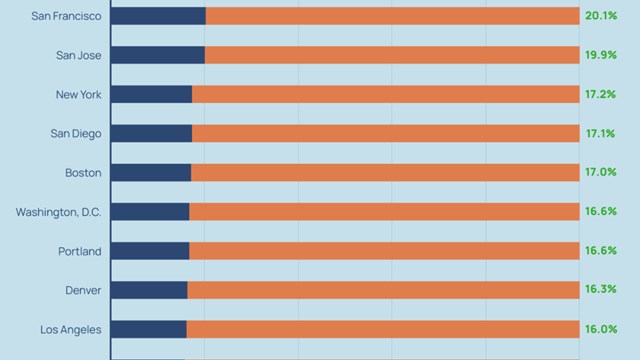In recognition of their service to their country, veterans of the United States Armed Forces are entitled to an extensive system of benefits. Unfortunately, many veterans are not aware of the full extent of these benefits and don’t take full advantage of them. While the legal jargon used by the government to describe these benefits can sometimes be confusing, it pays to stay informed of veterans rights and entitlements. Government benefits offer significant financial aid to veterans, ranging from tax breaks to government-guaranteed home loans (not to mention the plethora of non-real-estate benefits). So it is important that veterans–and co-op buildings that have veteran shareholders–make themselves aware of the benefits that they are entitled to.
Tax Breaks
The City of New York Department of Finance gives property tax exemptions to qualified veterans of the U.S. Armed Forces. When a veteran lives in a co-op building, the board includes this exemption on the building’s tax forms, but 100 percent of the veterans tax break should be returned to the veteran.
"Many co-op boards take this tax abatement and spread it out among all the shareholders in the building," says Kenneth Jacobs, an attorney with Manhattan law firm of Smith, Buss & Jacobs.
When co-op boards spread the tax abatement among all the shareholders in a building, it is usually done more out of ignorance than dishonesty, but the exemption is for the veteran–it its entirety–and nice as it is to share the wealth, that’s not the reason the exemption exists.
Says Jacobs, "[Vets] need to be informed shareholders–to be aware of the benefits that they are entitled to…they have to track the money, because boards sometimes don’t know to, or choose not to, pass benefits on to them."
Who Qualifies?
For a veteran to receive the Real Property Tax Exemption (and most other veterans benefits) he or she must have been honorably discharged from the service. The abatement applies to veterans who served in the armed forces during one of the following periods of conflict: the Persian Gulf War, the Vietnam War, the Korean War, World War I, and World War II. It also applies to veterans who received expeditionary medals for their service in Panama, Lebanon, or Grenada.
Also, certain civilians who assisted the Allied forces overseas during World War II are entitled to this tax break as well. This includes people who worked for the U.S. Merchant Marines, the American Field Service, and Pan American World Airways between 1941 and 1945.
The current War on Terrorism has not yet been added to the list of conflict periods that qualify veterans for this benefit, but it is likely to be added at some point in the future. Also, the end date of the Persian Gulf War has not yet been determined–for now, at least, anyone who served in the Persian Gulf after August 1, 1990 for at least 90 days is currently eligible to collect benefits.
The standard veterans tax break gives an exemption from property tax, up to $5,000, not including the portion of property tax that is dedicated to funding the public school system. The tax break applies to the primary residence of a veteran, the spouse of a veteran, or the un-remarried spouse of a deceased veteran. The current tax exemption is called the Veterans Exemption, and all qualified veterans are encouraged to apply for the benefit.
There used to be another tax break available to veterans, called the Eligible Funds Veterans Exemption. Applications for this exemption are no longer being accepted, but it continues to benefit people who’ve already claimed it. The difference between these exemptions is that the current Veterans Exemption mandates that the tax break apply solely to primary residences, and gives larger tax breaks to veterans with service-related disabilities. (All veterans who must move to another location or renovate their homes to accommodate a service-related disability are exempt from all property taxation.) Holders of the Eligible Funds benefit may transfer their application to the Veterans Exemption.
Veterans (and co-ops with veteran shareholders) can contact the New York State Department of Veterans Affairs at 1-888-VETS-NYS to request an application for this tax abatement. The application must be filed between July 15 and March 15, and the benefits will take effect on the July 1 following application. As part of the application process, veterans are required to provide discharge papers or other proof of service. Co-op residents will also need to have an officer of the board complete a section of their application.
VA Home Loans
The federal government also offers guaranteed home loans for veterans. Veterans who served in a period of conflict for at least 90 days are eligible for this benefit, as are veterans who served during peacetime for a minimum of two years. Veterans of the National Guard who served for a minimum of six years are also eligible.
VA home financing eases the financial strain on veteran homebuyers. Most borrowers do not need to make a down payment on their new home; the loan covers up to 100 percent of the reasonable value of the property (though it may not exceed $240,000); no monthly mortgage insurance payment is required, and these loans are very flexible in terms of payment plans and interest rates. Veterans participating in this program borrow from a regular lender (a bank, mortgage company, or savings and loan bank) and the federal government then guarantees the loan. Borrowers must prove that their household income is sufficient to cover the monthly payments on their home. These loans can be used for single-family dwellings, townhouses, and condominiums, but co-ops are currently not eligible. The Department of Veterans Affairs is conducting a study to determine whether co-ops should be eligible for VA loans, but has not yet reached a decision.
Anyone interested in obtaining more information about veterans home loans can find a wealth of information at: www.homeloans.VA.gov.
New Developments in VA Home Loans
In May 2001, the Department of Veterans Affairs issued a report on current problems within the VA Home Loan Program. A significant number of veterans holding government-guaranteed loans were defaulting on their mortgage payments, resulting in a large loss of government money. The report detailed the current state of the government loan processing centers, citing a lack of consistency in the way that requests for loan payment deferments were handled. The report stressed that the purpose of the loan program is to aid people who have served their country, and stated that they do not intend to make things more difficult for veterans participating in this program. The committee recommended that government loan servicing offices install a unified computer system to help loan officers more closely monitor the status of government-guaranteed loans. The goal is to help veterans avoid foreclosure on their homes by addressing payment problems at an early stage and informing them of refinancing plans that could make their payments more affordable.
Although it takes some time to wade through the particulars of the vets benefits program, it’s worthwhile for veterans to make an effort to stay up-to-date on these issues. The rules of this game change frequently–and changes often result in added benefits. Co-op boards should also take some responsibility for ensuring that all qualified veterans participate in the tax break program by including a notice in their building’s monthly newsletter, posting signs in the lobby, or otherwise keeping shareholders informed of benefits they might not be aware of. It is a waste for people not to claim money that is due to them, especially when these benefits are being offered in recognition of people who risked their lives in the service of their country.
Jennifer Baker is a freelance writer living in Brooklyn.







5 Comments
Leave a Comment